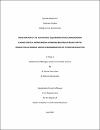INVESTIGATION OF THE NUTRITIONAL REQUIREMENTS AND CORRESPONDING CODING GENES OF HYDROCARBON-DEGRADING BACTERIAL STRAINS FOR THE PRODUCTION OF BIOMASS USEFUL IN BIOREMEDIATION OF PETROLEUM POLLUTION
Abstract
Petroleum-derived contamination events constitute one of the most dominant sources of environmental deterioration in the industrialized countries. Hydrocarbon compounds are recognized as toxic and carcinogenic organic pollutants and environmentally persistent. Bioremediation efforts aim to confine, restrain and mitigate the magnitude of contamination, in order to prevent additional decline of the environment and to protect all life forms from exposure to hazardous materials. The aim of this project is to study the role of medium components on the growth and biological activity of three locally isolated hydrocarbon degrading Pseudomonas aeruginosa strains. Furthermore, a factorial investigation of the strains’ potentiality to degrade diesel hydrocarbons by manipulating the nutritional microenvironment has been conducted. Then, stains are screened for genes encoding for hydrocarbon degradation activity. Results clearly showed the major role of nutritional elements such as carbon (supplied solely as diesel), nitrogen, and phosphorous play on the growth and metabolism of hydrocarbon degrading strains. Some strains were found tolerant to higher diesel concentrations under certain growth condition, but not in another. Inhibition by elevated carbon (diesel) concentration by the second week of culturing was noted. Nitrogen was significantly affecting cells growth under all experimental conditions and to a lesser extent was phosphorous. The strains’ response to altered growth conditions varied substantially; although they were from the same taxonomical group. Some strains were found more sensitive to changing C/N/P ratios than others. The analysis of diesel removal by GC confirmed the capability of our strains to degrade hydrocarbons under different growth conditions. Molecular investigation of our strains demonstrated that one Pseudomonas aeruginosa strain (QDD1) possessed the alkB1 gene encoding for alkane hydroxylase enzyme participating in the catabolic pathway of n-alkanes. The other strains were found to lack this particular gene. The genetic makeup of strain QDD1 was distinguished to be different from other strains as well as its biodegradation potential and its sensitivity to nutritional manipulations. The Arabian Gulf including Qatar is recognized as one of the most oil contaminated areas worldwide. With the experience of the worlds’ largest and most devastating oil incidents in history and with the natural and anthropogenic stresses; the Gulf environment is highly vulnerable and susceptible to further deterioration. This research project attempts to use the technology of microbial bioremediation in order to solve the environmental pollution resulting from the oil and gas industry. It will be the best local environmental-friendly solution and the most favorable for maintaining Qatar's environment sustainability. To the best of our knowledge, the work of this project is the first in the state, which investigates the naturally existing microbes in remediating petroleum pollution. Qatar’s extreme weather conditions and the special characteristics of local soils make this project of interest to implement local microbes in local polluted areas.
DOI/handle
http://hdl.handle.net/10576/3903Collections
- Biological & Environmental Sciences [102 items ]


